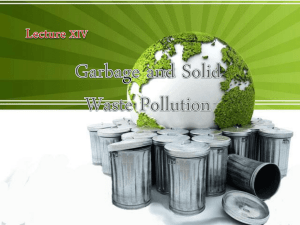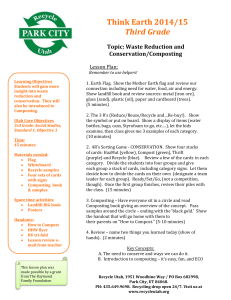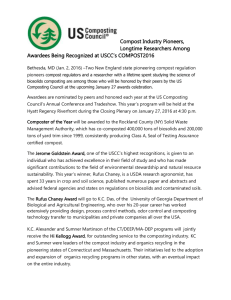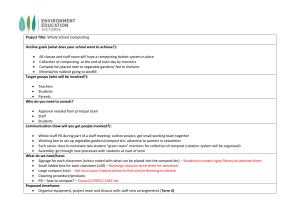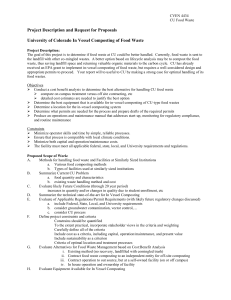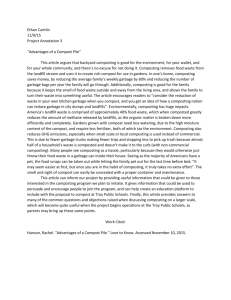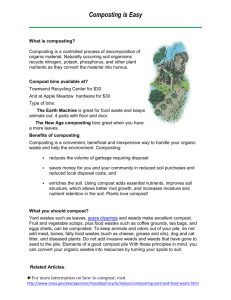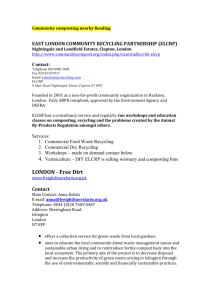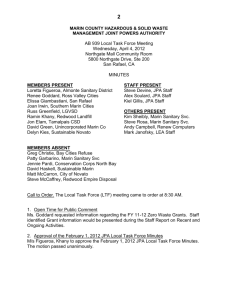SN Landfill Composting Ltr-5
advertisement
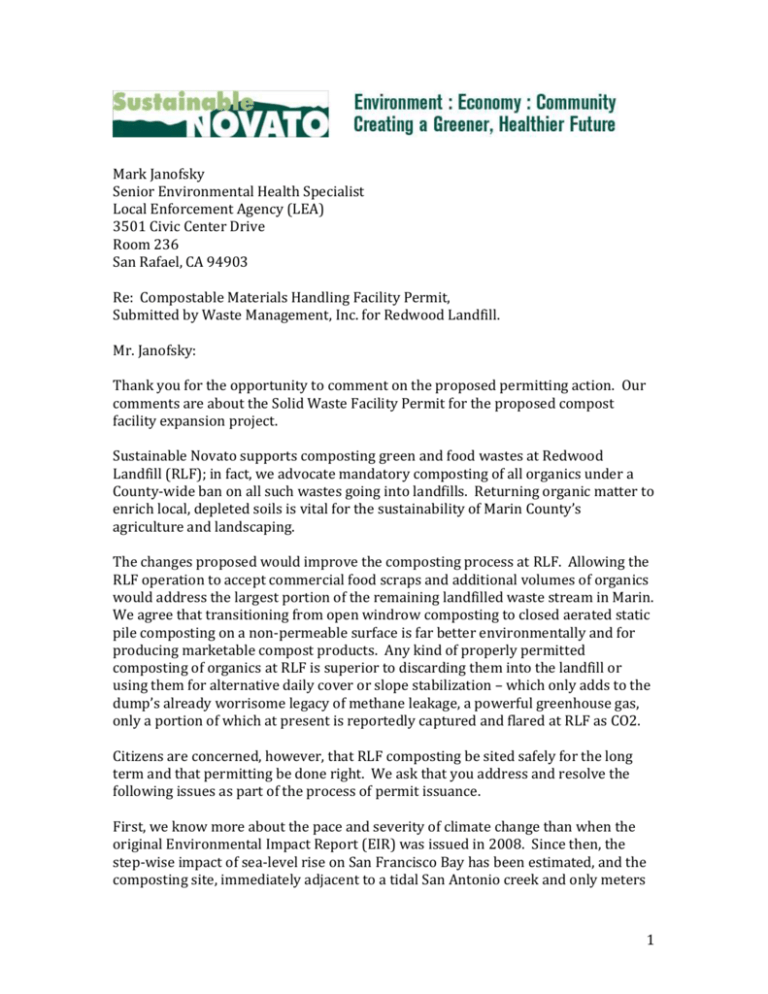
Mark Janofsky Senior Environmental Health Specialist Local Enforcement Agency (LEA) 3501 Civic Center Drive Room 236 San Rafael, CA 94903 Re: Compostable Materials Handling Facility Permit, Submitted by Waste Management, Inc. for Redwood Landfill. Mr. Janofsky: Thank you for the opportunity to comment on the proposed permitting action. Our comments are about the Solid Waste Facility Permit for the proposed compost facility expansion project. Sustainable Novato supports composting green and food wastes at Redwood Landfill (RLF); in fact, we advocate mandatory composting of all organics under a County-wide ban on all such wastes going into landfills. Returning organic matter to enrich local, depleted soils is vital for the sustainability of Marin County’s agriculture and landscaping. The changes proposed would improve the composting process at RLF. Allowing the RLF operation to accept commercial food scraps and additional volumes of organics would address the largest portion of the remaining landfilled waste stream in Marin. We agree that transitioning from open windrow composting to closed aerated static pile composting on a non-permeable surface is far better environmentally and for producing marketable compost products. Any kind of properly permitted composting of organics at RLF is superior to discarding them into the landfill or using them for alternative daily cover or slope stabilization – which only adds to the dump’s already worrisome legacy of methane leakage, a powerful greenhouse gas, only a portion of which at present is reportedly captured and flared at RLF as CO2. Citizens are concerned, however, that RLF composting be sited safely for the long term and that permitting be done right. We ask that you address and resolve the following issues as part of the process of permit issuance. First, we know more about the pace and severity of climate change than when the original Environmental Impact Report (EIR) was issued in 2008. Since then, the step-wise impact of sea-level rise on San Francisco Bay has been estimated, and the composting site, immediately adjacent to a tidal San Antonio creek and only meters 1 from sensitive Petaluma Marsh wetlands, appears quite vulnerable, especially when severe storms and king tides exacerbate already risen sea levels. Photos taken this year during king tides show Bay waters lapping at the tops of existing levees and surging beyond previous marks elsewhere in San Francisco Bay. See, for example, photos at https://www.facebook.com/californiakingtides and http://www.bcdc.ca.gov/planning/climate_change/KingTides.pdf. The below photo (2006) shows RLF’s levee being repaired after a high-tide storm breach. Authoritative calculations of projected future sea-level rise on San Francisco Bay are at http://www.bcdc.ca.gov/planning/climate_change/index_map.shtml and http://geology.com/sea-level-rise/san-francisco.shtml. FEMA is in the process of expanding 100-flood zones in the North Bay, anticipating greater threat from sealevel rise: see http://www.r9map.org/Pages/San-Francisco-Coastal-Bay-Study.aspx. Home and business owners were informed by FEMA representatives in public meetings in Marin County in September, 2013 of the likelihood of mandatory insurance in new areas and increases in flood insurance rates in old floodplain areas. Information about risks of sea-level rise and extreme weather to the Landfill and its composting project have been accumulating steadily. We would appreciate County assurance that such new data have been taken into account since the previous EIR. Please supplement your analysis with site-specific evidence that you have considered rapidly changing climate science and local knowledge that bears on the permitting of the proposed large-scale, new compost operation. We see that mitigation measure 3.5.6 in Appendix B addresses this issue and requires revised monitoring and reporting: “3.5.6d: Prior to project approval, the applicant shall prepare and submit to the LEA and the San Francisco Bay Regional Water Quality Control Board (RWQCB) a plan for long-term flood protection of the site.” We look forward to the opportunity to review the LEA’s and RWQCB assessment of the adequacy of the plan prior to approval. Second, we seek clarification on why the new permit allows 25,584 tons per year of biosolids (treated sewage sludge) to be composted when both the Waste 2 Management, Inc. (WMI) representative and the LEA stated at the October 10, 2013 information meeting that WMI had no intent to compost biosolids and that it was a “worst case scenario”. If it needs to be included as an option, can better language be included in the permit about what the circumstances would be for composting of biosolids? Third, the Addendum does not appear to add any new or additional safeguards for the composting operation despite its being closer to the wetlands than the landfill footprint itself within which more stringent standards apply. It is not clear from the Addendum whether the landfill has executed required mitigation measures – a stability analysis, a new design for levee repair, and updated plan for long-term flood protection – that were previously stipulated. Fourth, the Addendum does not appear to analyze the specific risk of storing additional wastewater in a pond next to San Antonio Creek barely above creek level where severe storms and sea-level rise could plausibly cause pond failure and discharge of wastewater into the Bay or creek unless the risk is adequately mitigated. In summary, the stipulated Greenhouse Gas Reduction Plan, updated earthquake plan and leachate management plan, and other mitigation measures are required prior to project approval and/or upon issuance of the revised permit. Being concerned about flood protection, slope stability, wastewater and leachate management, among other environmental and operational issues, we would appreciate the opportunity to review the regulatory assessments of the adequacy of the plans prior to approval. As long-time community supporters of composting, we ask that you take these siting and control concerns into account within the scope of environmental review so that we can rest assured that this particular composting facility does not cause more issues than it solves. Sincerely, /s/ Edward A. Mainland Director and Secretary Sustainable Novato 1017 Bel Marin Keys Blvd. Novato, CA 94949 415-902-6365 3
